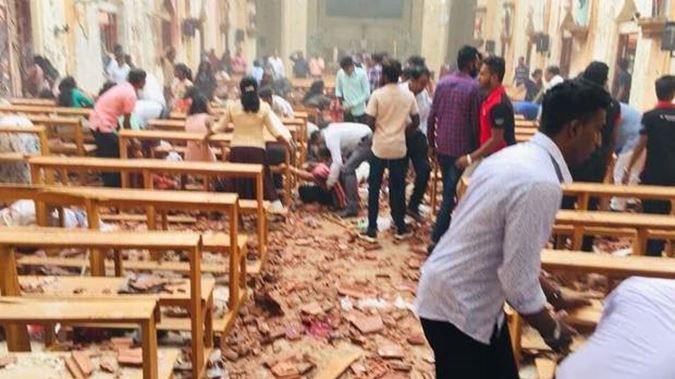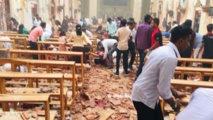An improvised explosive device was found inside a plastic pipe close to the airport and defused, a spokesman for the Air Force said.
President Maithripala Sirisena returned to the country via the same airport late Sunday.
While there has been no claim of responsibility for the multiple explosions earlier in the day, Prime Minister Ranil Wickremesinghe said he would seek support from abroad to find out whether the attackers were linked to international terrorism.
"We will not allow terrorism to raise its head in Sri Lanka. All action will be taken to wipe out terrorism," Wickremesinghe said in a televised statement.
The government imposed restrictions on social media after claiming various false rumours were being shared over the sites.
State Defence Minister Ruwan Wijewardene said that seven people have been arrested following the attacks, but police spokesman Ruwan Gunasekara confirmed only that at least three locals have been taken into custody.
The explosions took place during busy Easter services at Christian churches in the cities of Negombo, Batticaloa and the capital Colombo. Most of the casualties were said to have occurred at these sites.
Only about 7 per cent of Sri Lanka's population is Christian. The majority are Buddhists.
Three luxury hotels frequented by tourists were hit in Colombo.
Later in the afternoon a seventh explosion took place at a small hotel in a suburb of Colombo, where two peopled died. An eighth blast hit in a residential area of Dematagoda, another suburb of Colombo. There, three policemen were killed when a wall collapsed.
Gunasekara said that the policemen had visited a house in Dematagoda as part of their investigation into the morning explosions when the blast went off.
One of the church attacks, in Negombo, was suspected to have been a suicide bombing, but investigations into the nature of the other blasts are continuing, Gunasekara said.
The explosions at the hotels and churches took place within in about 30 minutes of each other.
Among the dead were 32 foreigners, according to Sri Lanka Tourism Board officials. Three Indians, three Danes, five Britons, "several" US citizens and a Dutch national were killed, their governments said.
The Tourism Board also said nationals from China, Belgium, Japan, Turkey, Bangladesh, Pakistan and Portugal were killed.
Many of the tourists killed were staying at the Cinnamon Grand, Kingsbury and Shangri-La - three high-end hotels hit in Colombo.
Sirisena said he would be appointing a team headed by a Supreme Court judge to investigate the blasts.
Wickremesinghe said in a Twitter message that "the attacks were clearly aimed at destabilizing the country."
The incidents were the first major blasts in the capital since the end in 2009 of the 26-year-long conflict in which rebels were fighting for an independent homeland for minority Tamils in the north and east of the country.
World leaders expressed shock at the blasts on Easter Sunday.
Pope Francis told tens of thousands of worshippers at the Vatican that he was "pained and distressed" by news of the blasts.
"I would like to express to the Christian community that's been affected, as they were gathered in prayer, and all the victims of such gruesome violence my heartfelt closeness," said the pontiff.
President Maithripala Sirisena returned to the country via the same airport late Sunday.
While there has been no claim of responsibility for the multiple explosions earlier in the day, Prime Minister Ranil Wickremesinghe said he would seek support from abroad to find out whether the attackers were linked to international terrorism.
"We will not allow terrorism to raise its head in Sri Lanka. All action will be taken to wipe out terrorism," Wickremesinghe said in a televised statement.
The government imposed restrictions on social media after claiming various false rumours were being shared over the sites.
State Defence Minister Ruwan Wijewardene said that seven people have been arrested following the attacks, but police spokesman Ruwan Gunasekara confirmed only that at least three locals have been taken into custody.
The explosions took place during busy Easter services at Christian churches in the cities of Negombo, Batticaloa and the capital Colombo. Most of the casualties were said to have occurred at these sites.
Only about 7 per cent of Sri Lanka's population is Christian. The majority are Buddhists.
Three luxury hotels frequented by tourists were hit in Colombo.
Later in the afternoon a seventh explosion took place at a small hotel in a suburb of Colombo, where two peopled died. An eighth blast hit in a residential area of Dematagoda, another suburb of Colombo. There, three policemen were killed when a wall collapsed.
Gunasekara said that the policemen had visited a house in Dematagoda as part of their investigation into the morning explosions when the blast went off.
One of the church attacks, in Negombo, was suspected to have been a suicide bombing, but investigations into the nature of the other blasts are continuing, Gunasekara said.
The explosions at the hotels and churches took place within in about 30 minutes of each other.
Among the dead were 32 foreigners, according to Sri Lanka Tourism Board officials. Three Indians, three Danes, five Britons, "several" US citizens and a Dutch national were killed, their governments said.
The Tourism Board also said nationals from China, Belgium, Japan, Turkey, Bangladesh, Pakistan and Portugal were killed.
Many of the tourists killed were staying at the Cinnamon Grand, Kingsbury and Shangri-La - three high-end hotels hit in Colombo.
Sirisena said he would be appointing a team headed by a Supreme Court judge to investigate the blasts.
Wickremesinghe said in a Twitter message that "the attacks were clearly aimed at destabilizing the country."
The incidents were the first major blasts in the capital since the end in 2009 of the 26-year-long conflict in which rebels were fighting for an independent homeland for minority Tamils in the north and east of the country.
World leaders expressed shock at the blasts on Easter Sunday.
Pope Francis told tens of thousands of worshippers at the Vatican that he was "pained and distressed" by news of the blasts.
"I would like to express to the Christian community that's been affected, as they were gathered in prayer, and all the victims of such gruesome violence my heartfelt closeness," said the pontiff.









 Home
Home Politics
Politics











